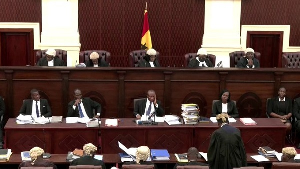The Association of Oil Marketing Companies (AOMCs) has lauded government’s effort to instilling discipline in downstream oil marketing sector and to ward off infiltrators whose nefarious activities cause the nation to lose millions of cedis in tax revenue.
The government lost revenue in excess of $500 million in 2016 through the illegal activities of Petroleum Black Market dealers.
The Association is, therefore, working in cooperation with the National Petroleum Authority (NPA), Ministry of Energy, Ministry of Finance and National Security to deal with illegal offshore and onshore oil Petroleum Black Market dealers to save the country and protect the interest of Oil Marketing Companies (OMC).
Mr Kwaku Agyemang-Duah, AOMC Industry Coordinator in an interview with the Ghana News Agency, explained that unscrupulous and irresponsible Ghanaians and foreigners have entered into the petroleum sector (Petroleum Black Market dealers) whose operations are inimical to the economy.
He said investigations have established that the Petroleum Black Market dealers engage in some illegal oil ships deal on the high seas in order to avoid the payment of taxes whilst others claims to be exporting the products to the land lock countries only to divert and sell the products locally.
According to the tax regulations, petroleum products being exported to the land lock countries does not attract taxes from Ghana.
Mr Agyemang-Duah admitted the existence of clandestine oil market transactions across the country, who after invading taxes and diverting the products sells it cheaply in “yellow gallons,” at vantage points and also on table tops.
He said the AOMC is working in cooperation with other sector actors to target any buyer of what it considers illegal petroleum products, “we are teaming up with relevant state authorities to toughen tactics against illegal oil operators”.
He said in a country where oil constitute large per cent of government’s budget, illegal deals, diversion of export products, and evasion of taxes is a potential threat to national revenue mobilization.
Mr Agyemang-Duah noted that the illegal operations is also affecting negatively the market share and investments of OMCs; “Not only is government losing tax revenue, scores of OMCs are also losing out as a result of sale of cheap products in the market and we are at the point of declaring employees redundant.
“The motoring public is also endangered for patronizing these ‘yellow gallon’ fuel as its quality cannot be guaranteed…operators do not also observe environment and safety measures, you buy cheap fuel at the peril of your life,” he said.
The Association is an industry association and a private initiative by the oil marketing operators in Ghana. “We are an advocacy institution established to help direct downstream policy, legislation and regulation and pursue research towards the development of the downstream sector”.
It also represents the collective interests of the companies involved in the oil marketing and petroleum products in Ghana, coordinating with the major Stakeholders in the Industry which include: Ministry of Petroleum, Ministry of Finance, Bank of Ghana, NPA, The Energy Commission, Environmental Protection Agency, Tema Oil Refinery, Revenue Agencies Governing Board, Ghana Standard Board, Ghana Fire Service, and Bulk Oil Storage and Transportation Company Limited.
Click to view details



Business News of Friday, 14 April 2017
Source: ghananewsagency.com

















